Justice for Oil Spill Victims in Nigeria
Air Date: Week of May 27, 2022
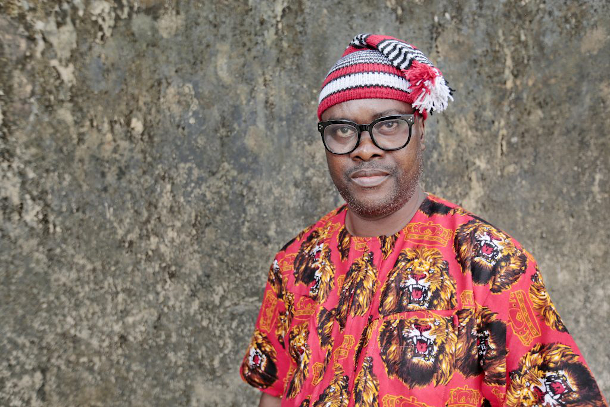
Chima Williams brought Royal Dutch Shell to justice for negligence in preventing oil spills in two communities (Photo: Goldman Environmental Prize)
The 2022 Goldman Environmental Prize Recipient for Africa is Chima Williams, an environmental lawyer who worked with two communities to hold Royal Dutch Shell accountable for disastrous oil spills in Nigeria. Co-hosts Aynsley O’Neill and Bobby Bascomb talk about the devastation the spills caused and how Chima Williams and his colleagues brought the case to the Hague in the Netherlands to pursue justice.
Transcript
O’NEILL: So Bobby, on this show we hear a lot about the many ways humans are damaging the environment.
BASCOMB: Oh man, that’s the truth.
O’NEILL: But the annual Goldman Environmental Prize celebrates the people working to protect our planet, and we have a series of interviews coming up with this year’s winners.
BASCOMB: Right, the Goldman prize is sometimes called the Green Nobel and it’s awarded to one winner from each continent. I hear you recently spoke with the winner from Africa.
O’NEILL: Yes! Chima Williams is a lawyer from Nigeria. He secured an unprecedented legal win at the Hague in the Netherlands against Royal Dutch Shell for its negligence in preventing oil spills in the Niger Delta.
BASCOMB: Yeah, I know that oil spills happen all too often in Nigeria, but rarely do we hear about companies actually being brought to justice for them.
O’NEILL. Exactly. And going up against Shell, one of the biggest oil companies in the world, wasn’t exactly easy. Chima says that some people told him it couldn’t be done.
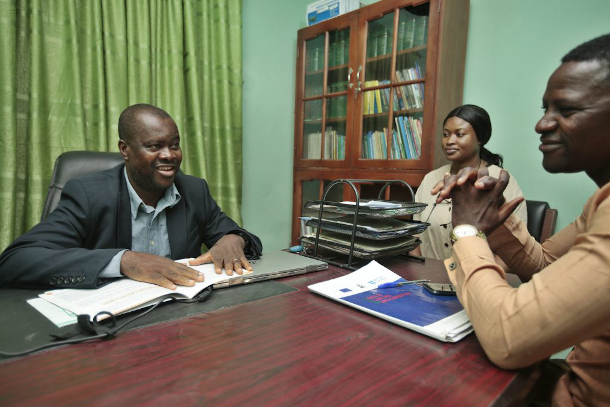
Chima Williams and colleagues at Friends of the Earth Nigeria, where he is Executive Director (Photo: Goldman Environmental Prize)
WILLIAMS: How can you challenge the almighty Shell, you know, how dare you challenge them, for the conduct and the practice that they have been engaged for years? But for us, because we have the conviction, because we have the belief, that look, until you think out of the box, you may not create the needed positive change.
BASCOMB: So how did they manage to bring Shell to justice?
O’NEILL: Well Chima and his legal team started by poring over dozens of examples of Shell oil spills in the Niger Delta, looking for the ones that seemed most clearly linked to negligence. And they landed on two in particular that seemed like open-and-shut cases, in the communities of Goi and Oruma. In 2004, Shell’s Trans-Niger pipeline developed a leak near Goi, but it didn’t stop there.
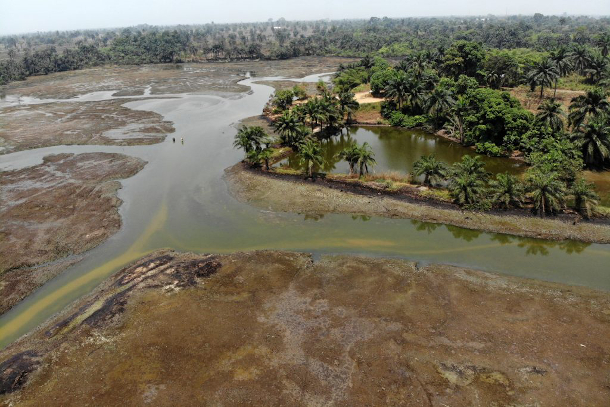
Oil pollution from the spill in Goi, Nigeria (Photo: George Osodi)
WILLIAMS: There was an explosion, fire explosion, that further helped to destroy things that were left by the spill pollution.
O’NEILL: And Chima says that even though the explosion from the spill was big news, Shell didn’t bother to clean it up until 33 months later.
BASCOMB: Wow, it took them nearly three years to clean it up?
O’NEILL: Right, and in 2005 another Shell pipeline near Oruma leaked for 12 days, polluting the land and drinking water.
BASCOMB: Wow, that’s awful. How did these spills affect the people living in Goi and Oruma?
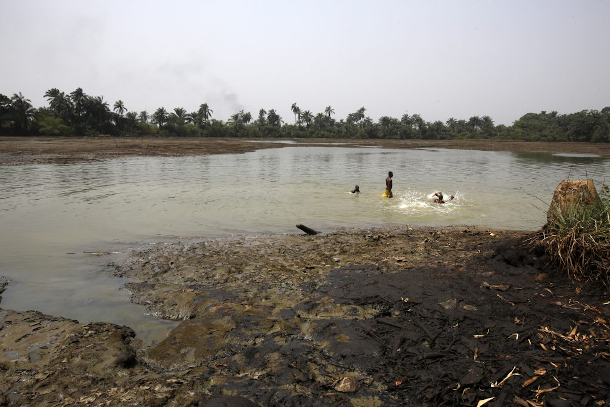
The Goi oil spill and explosion polluted farmers’ land, drinking water, and fishing ponds (Photo: George Osodi)
O’NEILL: It was pretty devastating, here’s Chima again.
WILLIAMS: People could no longer use their farmlands. People could no longer harvest fishes from their fish ponds. People could no longer harvest from their economic trees, which provided a source of livelihood for them. It was a huge and massive loss, and it affected majority of the community of people because there are indirect impacts and effects on people who unsuspectingly will drink, for example, from the polluted water, will use it to cook their food, will use it to bathe.
O’NEILL: The spills also released air pollutants that these communities were unknowingly breathing in.
WILLIAMS: So, people now would die mysteriously, or have strange ailments that is unexplainable. And we find in some situation it is either people begin to accuse each other of poisoning, or they will attribute it to activities of witches and wizards. Because what they cannot explain, they have to give it a name.
O’NEILL: Fortunately, Chima and his colleagues at Friends of the Earth Nigeria, where he’s the executive director, were able to help set the story straight for the villagers, that it wasn’t their neighbors who were poisoning them or using dark magic. It was a powerful corporation that did this to them. More specifically, it was Shell’s failure to install leak detection systems. They are standard practice in oil pipelines in Western nations, but Shell just didn’t bother with them in Nigeria. And during their investigation Chima and his legal team gained access to internal Shell documents that revealed the company knew the Goi pipeline was poorly maintained and needed replacement, and that executives had lied about it in court.
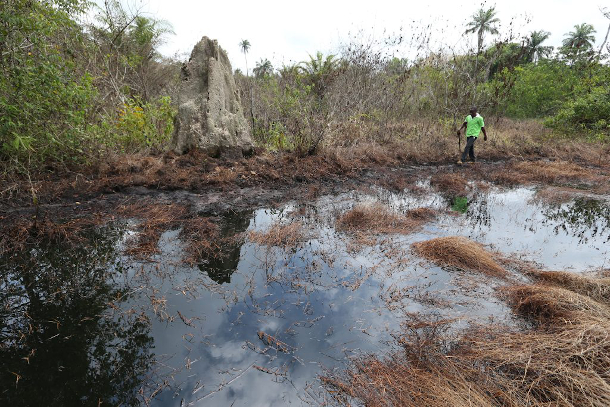
Oil pollution in the Niger Delta (Photo: George Osodi)
BASCOMB: Wow. So, I think you said that they won this legal victory in the Hague. But why did they have to go all the way from Nigeria to the Netherlands to get justice?
O’NEILL: Well, they wanted to try something different since the status quo just wasn’t working. Chima and his colleagues had won a previous case against Shell in 2005 over the company’s practice of gas flaring, another way oil extraction has polluted the air that people in the Niger Delta breathe. The federal high court of Nigeria ordered Shell to stop the flaring, but three years after the ruling, the company had still not complied.
WILLIAMS: The idea was, well, since the multinationals don’t respect the judgements of Nigerian courts, and the Nigerian authorities that are supposed to enforce this judgment are not enforcing it, let’s take them to their own home countries, where we believe that they will respect the law, they will obey and comply with court judgments.
O’NEILL: But Bobby, they actually lost the oil spill case, at first. The District Court of the Hague ruled in 2013 that Shell couldn’t be held liable for the actions of its Nigerian subsidiary. But that didn’t stop Chima.
WILLIAMS: Of course, that is the beauty of the right to appeal, if you feel strong about your case, like we did. When we lost at the lower court in the Hague, we were convinced that we were not supposed to lose the case, especially on the grounds that the court based to deliver the judgment against us.
O’NEILL: So they appealed and finally, in January 2021, the Court of Appeal of the Hague ruled that Royal Dutch Shell ultimately has oversight and control over the operations of its Nigerian subsidiary, including a duty to prevent oil spills. As a first step, the court ordered Shell to install a leak detection system on the Oruma pipeline, so this hopefully doesn’t keep happening.
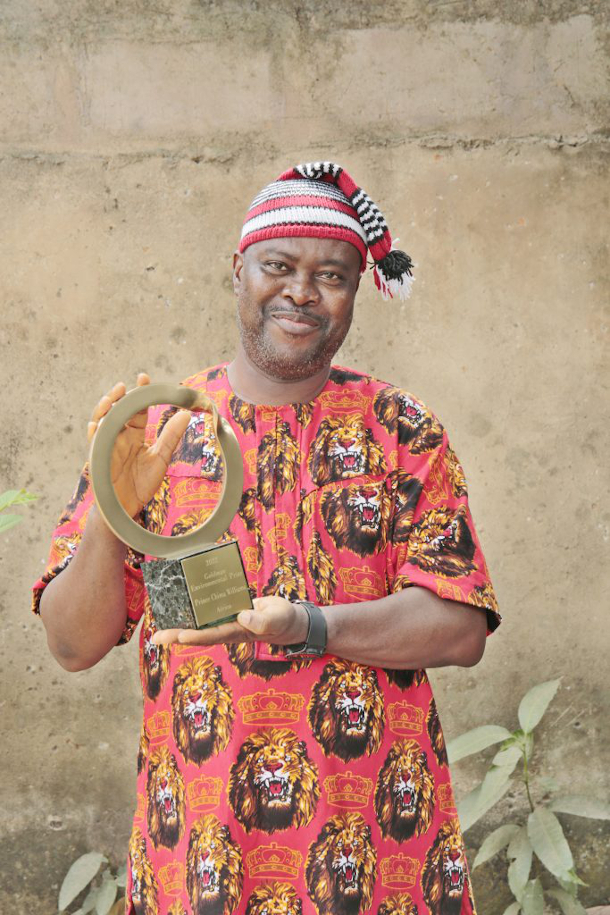
Chima Williams with the Goldman Environmental Prize (Photo: Goldman Environmental Prize)
BASCOMB: Well, that’s something I guess. But what about the farmers whose land was polluted?
O’NEILL: The court ruled that Shell must compensate them, but the amount is pending, so these farmers are still waiting for justice nearly 20 years after these spills occurred. But Chima says it’s not just about the money.
WILLIAMS: When you have wronged somebody, change of attitude brings a lot of succor. Seeing that there is restitution coming from the inside will mean that if you have the opportunity you will not repeat those things that happened. And I think that is the greatest debt that the oil companies owe the people of Niger Delta. To show that empathy to the people for the long years of destruction of their source of livelihood, their environment and creation of problems for them. There can be no better way of any compensatory offer than that. That is what I expect to come from them.
BASCOMB: I would sure hope so. Well, thanks Aynsley for bringing us Chima Williams’ story, and I’m really looking forward to hearing from the other Goldman Prize winners in the coming weeks.
O’NEILL: Yeah! The prize is given to a winner from each inhabited continent, so among others we’ll hear from the recipients from South and Central America, two young Indigenous leaders who got Ecuador to cancel dozens of illegal gold mining concessions in their territory.
BASCOMB: And I spoke with the winner from Asia, a Thai activist who led a campaign against a blasting project that would have destroyed nearly 250 miles of the Mekong River.
O’NEILL: Wow, I can’t wait to hear that.
Links
Watch: Chima Williams’s Acceptance Speech for the 2022 Goldman Environmental Prize
Living on Earth wants to hear from you!
Living on Earth
62 Calef Highway, Suite 212
Lee, NH 03861
Telephone: 617-287-4121
E-mail: comments@loe.org
Newsletter [Click here]
Donate to Living on Earth!
Living on Earth is an independent media program and relies entirely on contributions from listeners and institutions supporting public service. Please donate now to preserve an independent environmental voice.
NewsletterLiving on Earth offers a weekly delivery of the show's rundown to your mailbox. Sign up for our newsletter today!
 Sailors For The Sea: Be the change you want to sea.
Sailors For The Sea: Be the change you want to sea.
 The Grantham Foundation for the Protection of the Environment: Committed to protecting and improving the health of the global environment.
The Grantham Foundation for the Protection of the Environment: Committed to protecting and improving the health of the global environment.
 Contribute to Living on Earth and receive, as our gift to you, an archival print of one of Mark Seth Lender's extraordinary wildlife photographs. Follow the link to see Mark's current collection of photographs.
Contribute to Living on Earth and receive, as our gift to you, an archival print of one of Mark Seth Lender's extraordinary wildlife photographs. Follow the link to see Mark's current collection of photographs.
 Buy a signed copy of Mark Seth Lender's book Smeagull the Seagull & support Living on Earth
Buy a signed copy of Mark Seth Lender's book Smeagull the Seagull & support Living on Earth

